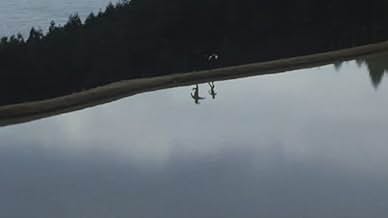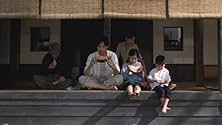AVALIAÇÃO DA IMDb
7,5/10
8 mil
SUA AVALIAÇÃO
O marido de uma jovem aparentemente comete suicídio sem aviso ou motivo, deixando para trás a esposa e o filho.O marido de uma jovem aparentemente comete suicídio sem aviso ou motivo, deixando para trás a esposa e o filho.O marido de uma jovem aparentemente comete suicídio sem aviso ou motivo, deixando para trás a esposa e o filho.
- Direção
- Roteiristas
- Artistas
- Prêmios
- 9 vitórias e 1 indicação no total
- Direção
- Roteiristas
- Elenco e equipe completos
- Produção, bilheteria e muito mais no IMDbPro
Avaliações em destaque
And beautiful and fascinating film with a gentle lyric quality. Runs directly counter to the usual Hollywood expectations. The most emotionally packed scene is filmed in extreme longshot! You can't even see the faces of the actors but the location and the action that you can see are enough. If you want to see a standard hollywood formula, then stay away. If you like quiet and moving films shot in entirely new ways (granted the director owes much to Ozu) then get this film.
Rarely do I rate films so highly, but Maborosi earned it's nine. A large part of my enjoyment of the film was due to the beautiful and subtle directing that seemed to compliment the story itself perfectly. Koreeda is a very promising Japanese director. I recommend this one to all serious movie watchers, and I await his future films.
With a cinematic eye that harks back to Kurosawa and the first color features of Antonioni (esp. Red Desert & Blowup), Maborosi is one of the quietest and most delicate little films you will ever see. It is the absolute antidote to fare like Die Hard.
Wow, there are some pretty extreme reviews of this film. I've read both the LOVED ITs and the HATED ITs, and I agree with both. So what's the deal? Is this the best film ever, or should it be used as a torture device at Guantanamo Bay?
All I can say is that I experienced moments of both extremes, but in the end I was unsatisfied. It begins provocatively with an interesting flashback, told very poetically through high contrast shots with deep perspective. This sets the tone very nicely and even manages to inject some suspense into the film. But the movie's downfall is excessive, gratuitous repetition in the hours that follow.
The plot develops suddenly within the first 30 mins or so. From then on, don't expect much of a story because the rest is a highly impressionistic mood-type piece with little dialogue and less action. That's not necessarily a bad thing; directors like Ming-liang Tsai (THE HOLE) have pulled it off successfully, but what irked me in this case was the gratuitous repetition. Yes, I know I said "gratuitous repetition" already. Good to see you're paying attention ;)
I counted 5 scenes (long ones) of the heroine sitting in a dark room staring out a window with a ghostly light illuminating her face. It was stirring the first time, but after a few more times it's simply redundant & anticlimactic. Another great image--used powerfully at first but losing its charm after the 3rd or 4th beating over the head--is a far shot of a body of water where our eye is drawn to the reflections of people on the surface. OK, Koreeda, we get the picture; the film is about the contrast between shadows and bright light, reality and deceptive illusion, that which we do not understand vs. that which we *think* we understand. If it were presented more concisely, I would have loved it. But did he really require 2 hours to say it? And if so, could he not have explored it more deeply, rather than leaving us with a somewhat shallow climactic monologue at the end? (I call it a 'monologue', but actually it's only 2 or 3 sentences which summarize the whole point of the film.)
In the end, my impression of MABOROSHI is much like my impression of Koreeda's later film AFTER LIFE (which I think is much better than this); the philosophy is very interesting, there are certain poetic moments that will captivate you, but when the film is over you get the feeling that you've just read a haiku. Nothing more.
All I can say is that I experienced moments of both extremes, but in the end I was unsatisfied. It begins provocatively with an interesting flashback, told very poetically through high contrast shots with deep perspective. This sets the tone very nicely and even manages to inject some suspense into the film. But the movie's downfall is excessive, gratuitous repetition in the hours that follow.
The plot develops suddenly within the first 30 mins or so. From then on, don't expect much of a story because the rest is a highly impressionistic mood-type piece with little dialogue and less action. That's not necessarily a bad thing; directors like Ming-liang Tsai (THE HOLE) have pulled it off successfully, but what irked me in this case was the gratuitous repetition. Yes, I know I said "gratuitous repetition" already. Good to see you're paying attention ;)
I counted 5 scenes (long ones) of the heroine sitting in a dark room staring out a window with a ghostly light illuminating her face. It was stirring the first time, but after a few more times it's simply redundant & anticlimactic. Another great image--used powerfully at first but losing its charm after the 3rd or 4th beating over the head--is a far shot of a body of water where our eye is drawn to the reflections of people on the surface. OK, Koreeda, we get the picture; the film is about the contrast between shadows and bright light, reality and deceptive illusion, that which we do not understand vs. that which we *think* we understand. If it were presented more concisely, I would have loved it. But did he really require 2 hours to say it? And if so, could he not have explored it more deeply, rather than leaving us with a somewhat shallow climactic monologue at the end? (I call it a 'monologue', but actually it's only 2 or 3 sentences which summarize the whole point of the film.)
In the end, my impression of MABOROSHI is much like my impression of Koreeda's later film AFTER LIFE (which I think is much better than this); the philosophy is very interesting, there are certain poetic moments that will captivate you, but when the film is over you get the feeling that you've just read a haiku. Nothing more.
Steeped in the traditions of the lush visual beauties of Japanese cinema, and influenced by the likes of Taiwanese (?) director Hsiao Hsien Hou (I believe there are several fairly direct quotes) or the luminous cinematography of Bergman's long time cameraman, Sven Nykvist. This film directly mines the visual effects of some of the most glorious European painters of light like Vermeer, Caravaggio, and Georges de la Tour. From the subtitles it seems that MABOROSI means 'strange light' and Kore eda uses almost nothing but strange, rich luminosity to tell his story (although he also gets a fine, somber perfomance from his female lead). Each shot is deeply thought out and composed to the maximum. Literally, every single shot. The results are tranquil and beautiful. The story is as quiet as the light, and probably if you require your film to have a strong direct narrative you should stay away from this as the story is told very subtly using light and almost subliminal sound (it seemed to me there were ocean waves in the sub background even in the city shots, for example). It works great as cinema. I would suggest that you watch at least the first 20 minutes or so again, after watching the whole film. The same motifs cross and criss cross all through the film and it really builds a wonderful texture.
I would recommend this as a double bill with something like the Actor's Revenge by Ichikawa- also deeply steeped in lush visual beauties and light. Or else Angel Dust by Sogo Ishii-a very opposite film full of passion, madness and violence, but where you see that meticulous, relentless search for supercomposition on almost a frame for frame basis. Or lastly, the tranquil, and beautiful, and very painterly Why Has Bodhidharma Left For The East- a Korean film by Bae Yong Kyun and something of a successful Zen meditation. Well one more, Mystery of Rampo-by Kazuyoshi Okuyama- very offbeat with bewitchingly lush visual beauty. (Rampo is Japanese for Edgar Allen Poe and the first Japanese mystery writer adopted Rampo as his nom de plume)
I would recommend this as a double bill with something like the Actor's Revenge by Ichikawa- also deeply steeped in lush visual beauties and light. Or else Angel Dust by Sogo Ishii-a very opposite film full of passion, madness and violence, but where you see that meticulous, relentless search for supercomposition on almost a frame for frame basis. Or lastly, the tranquil, and beautiful, and very painterly Why Has Bodhidharma Left For The East- a Korean film by Bae Yong Kyun and something of a successful Zen meditation. Well one more, Mystery of Rampo-by Kazuyoshi Okuyama- very offbeat with bewitchingly lush visual beauty. (Rampo is Japanese for Edgar Allen Poe and the first Japanese mystery writer adopted Rampo as his nom de plume)
Você sabia?
- CuriosidadesHirokazu Koreeda's directorial film debut.
Principais escolhas
Faça login para avaliar e ver a lista de recomendações personalizadas
- How long is Maborosi?Fornecido pela Alexa
Detalhes
Bilheteria
- Faturamento bruto mundial
- US$ 144.025
Contribua para esta página
Sugerir uma alteração ou adicionar conteúdo ausente











